

Everyone loves the luxurious and cozy feeling of a soft carpet under their feet. Not only do carpets add an element of warmth and comfort to any room, but they also come in a wide variety of styles, materials, and types to suit different needs and preferences.
In this guide, we will take you on a journey through the lush tapestry of carpets. We will explore the different types of carpet available on the market, discuss their unique features and benefits, and provide tips on how to choose the best one for your space.
Venturing into the world of carpet types can be overwhelming, but it doesn't have to be. With the right guidance, you can discover a world far beyond just flooring options; a universe where interior design meets innovation, home decor meets comfort, and your floor become the foundation of your dream space.
At Carpet One, we understand that flooring is an investment. You'll be living with these floors for years and chances are many milestones will take place on them from baby showers to graduations to retirement parties. This is why we empower our customers with the knowledge they need to bring their vision to life by guiding them through choosing the right carpet and carpet materials.
The choice of carpet types extends beyond just the aesthetic appeal. Factors such as the room's purpose, traffic levels, personal style, budget, and even climatic conditions come into play. Another critical consideration is the carpet backing, which significantly impacts the carpet’s durability, comfort, and performance. High-quality carpet backing can provide additional cushioning, reduce noise, and increase the carpet's lifespan by preventing wear and tear. Talk to the experts at Carpet One Floor & Home and they can help you match the best carpet product to your lifestyle needs.
Carpet fibers largely determine the performance and longevity of your carpet. They can be broadly classified into natural fibers like wool and synthetic fibers like nylon or polyester.
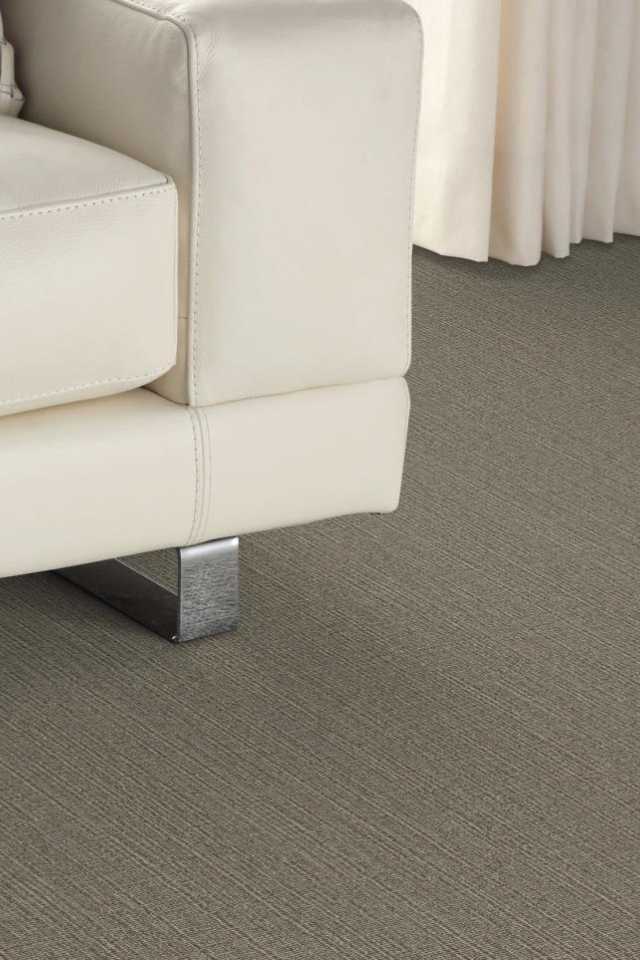
Natural fiber carpets, like a fine woven carpet, offer a unique blend of aesthetic appeal and durability. Wool, for instance, is a carpet fiber that offers an irresistibly soft touch, making it a plush carpet of choice for many homeowners. Sisal and jute carpets are also great flooring choices as they are made of 100% natural fibers that offer texture and aesthetic appeal.
Although natural fiber carpets are prized for their eco-friendly qualities, luxurious feel, and natural look, it's important to consider that they may be more susceptible to stains and wear over time. Because of this, natural fiber carpets are typically better suited for low-traffic areas, like bedrooms and home offices.
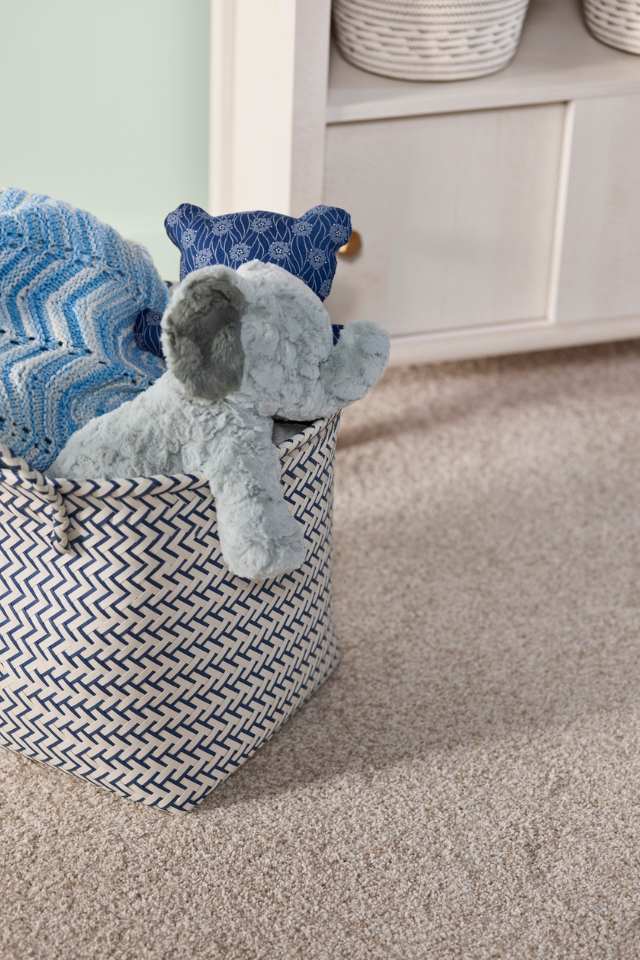
Unlike natural carpets, synthetic fiber carpets aren't composed of natural materials but of man-made fibers mostly derived from petrochemicals. Synthetic fiber carpets, like polyester or nylon carpets, offer greater durability, stain resistance, and a wider range of styles and colors, making them a more practical choice for high-traffic areas. Ideal for homes with kids or pets, synthetic carpets are a staple in residences looking for a blend of affordability and durability.
The pile of a carpet refers to the fabric loops sewn into its backing. They can be classified as cut pile, loop pile, or a mix of both. Different pile types significantly affect the look and feel of a carpet and each offers distinct advantages and disadvantages.
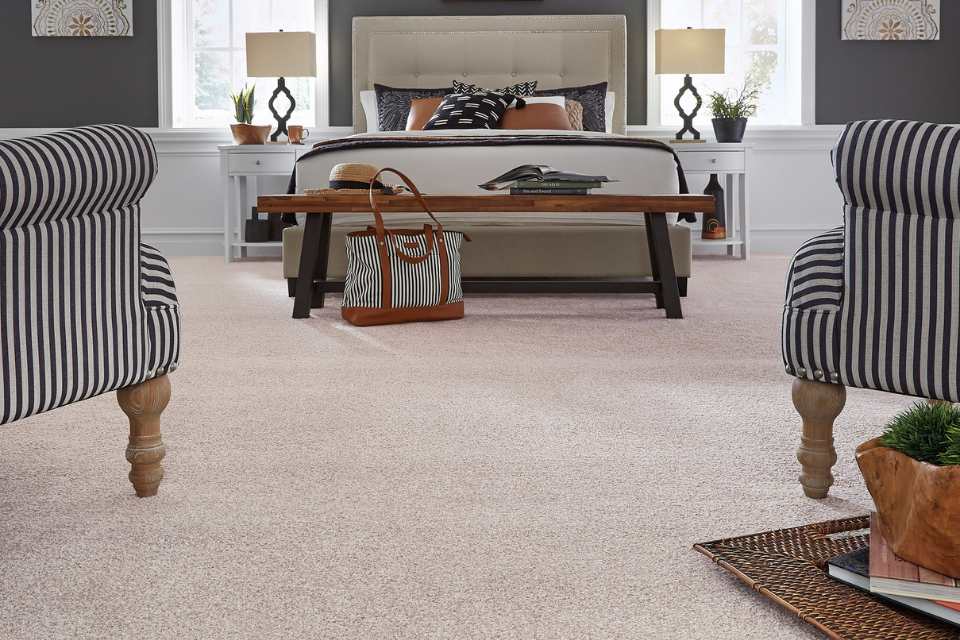
Traditional cut pile carpets, with their fiber ends exposed, offer a soft, plush feel underfoot. They are perfect for bedrooms and formal living rooms, providing a cozy and inviting atmosphere. Cut pile carpet comes in various heights, including low pile carpet for a sleek, modern look and easier maintenance, medium pile carpet for a balance of comfort and durability, and high pile carpet for a luxurious, cushioned experience. Formerly known as shag carpet, Frieze carpet is a high pile carpet with long, twisted fibers that create a casual and relaxed look, ideal for informal spaces.
Keep in mind that cut pile carpets tend to show footprints and vacuum marks more easily than other types of carpet.
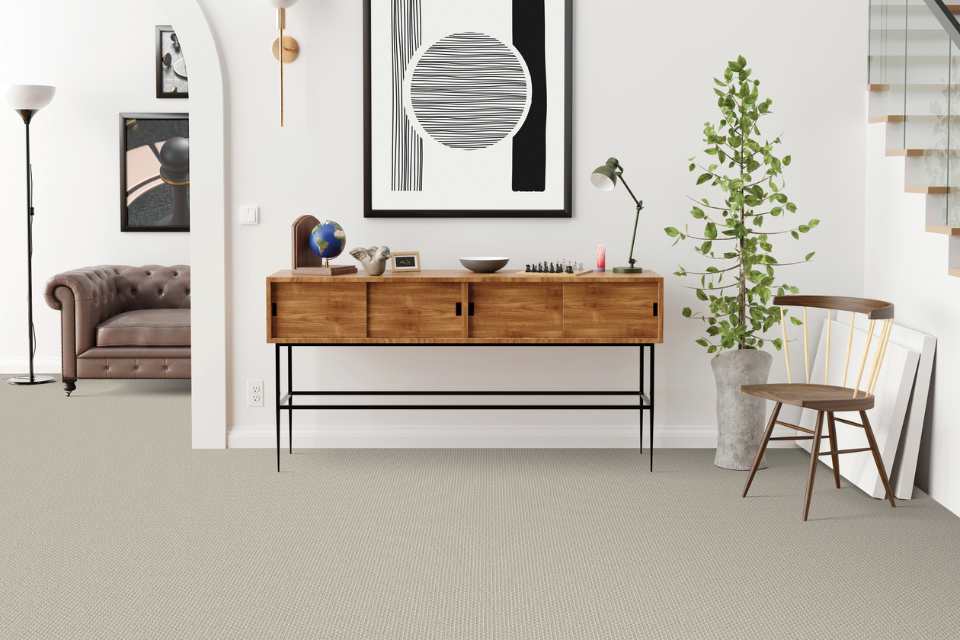
Loop pile carpets or Berber carpets, with their uncut loops, offer a resilient surface that stands up well to heavy foot traffic. Loop pile carpet is an ideal choice for bustling areas like hallways or living rooms. The tightly woven loops of Berber carpet not only provide a firm and supportive underfoot experience but also add a unique textured appearance that complements various interior styles. Plus, Berber carpet's ability to hide dirt and footprints makes it a practical and stylish option for active households.
While loop pile carpeting is often more durable than cut pile, it can be less comfortable underfoot and might snag on things like heels or pet claws.
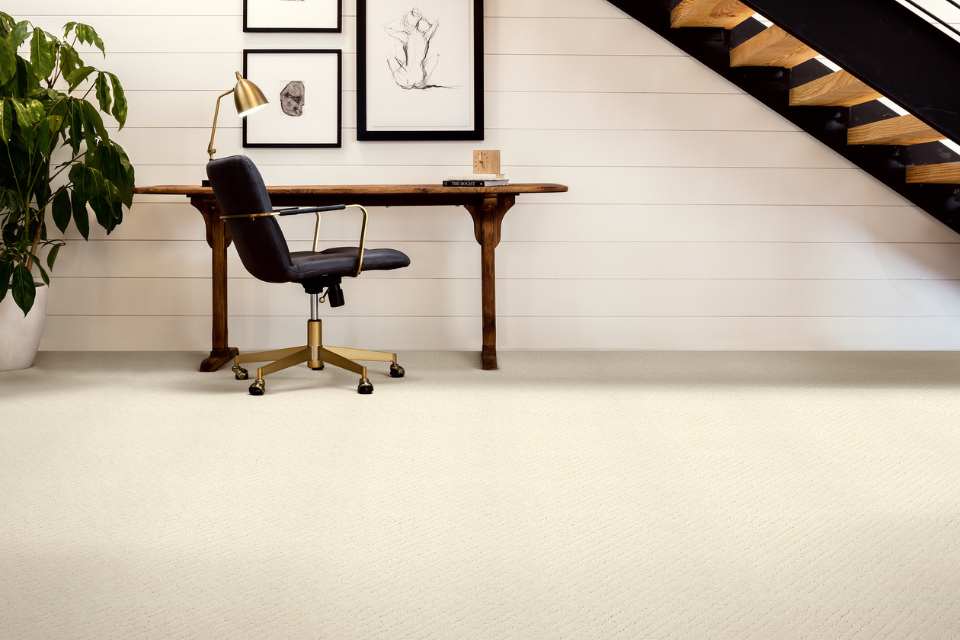
Cut and loop pile carpets offer the best of both worlds. Balancing softness and durability, they can be designed into a variety of patterns, offering a unique aesthetic appeal and texture underfoot. Cut and loop pile carpet is an excellent option for adding dimension to rooms like your home office or living spaces.
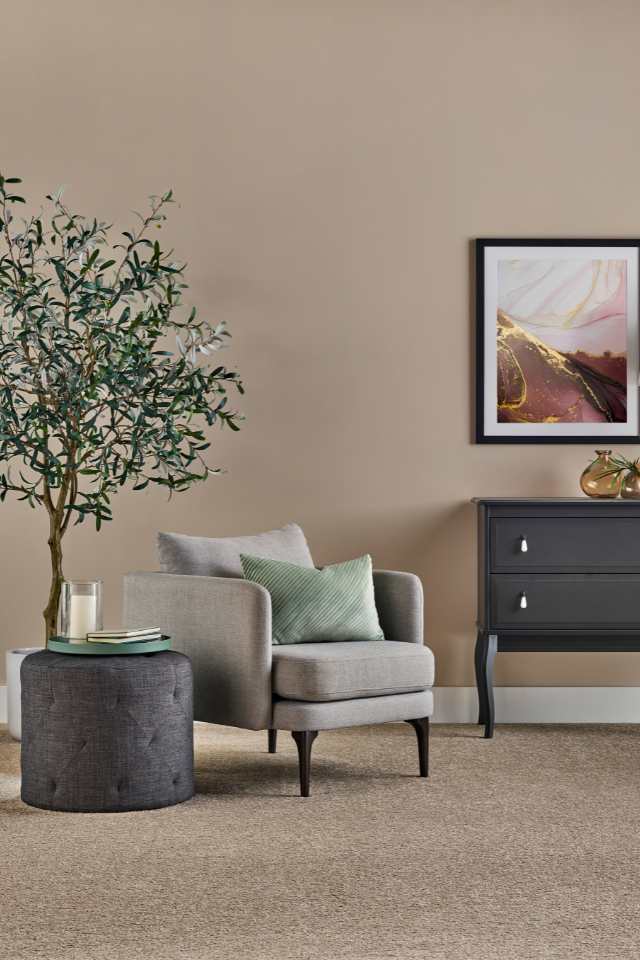
As a trusted source for flooring solutions, Carpet One takes pride in offering a diverse range of carpet styles, materials, and pile heights. Remember, the right carpet is not just about colors or trends, but an optimal blend of functionality, aesthetics, and affordability.
Are you ready to dive into our catalog and transform your home with a carpet that truly reflects your style and needs? Visit your local showroom or order samples from the comfort of your home to get started today!
At Carpet One, we understand that choosing the perfect carpet involves many considerations, from material and pile type to maintenance and installation. To help you make an informed decision, we've compiled answers to the most frequently asked questions about carpets.
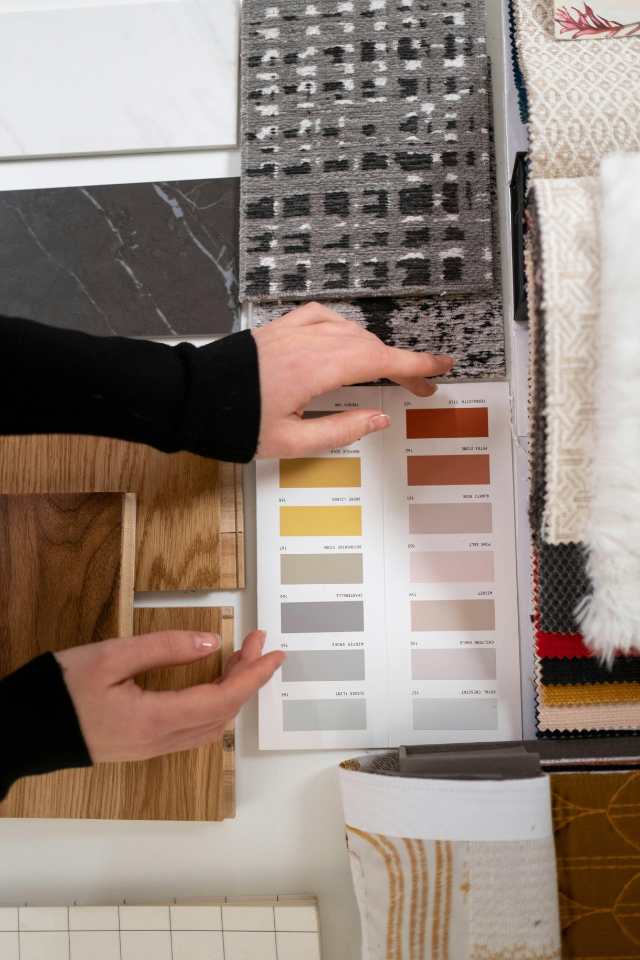
What role does underfoot comfort play in carpet selection, and what factors should be considered when choosing padding and assessing compatibility with underfloor heating?
Proper padding enhances the overall feel of your carpet, extends its lifespan, and ensures a cozy, inviting atmosphere in your home. Selecting the right padding for your carpet is key, so when choosing padding, consider factors like thickness, density, and material, as these influence cushioning and support. Thicker, denser padding provides superior comfort and durability, ideal for high-traffic areas and added insulation. If you're in need of carpet padding that's compatible with underfloor heating, look for padding specifically designed to allow efficient heat transfer without compromising comfort.
What maintenance tips can enhance the longevity of carpets?
To enhance the longevity of your carpets, regular vacuuming is essential to remove dirt and prevent fiber wear. Promptly addressing spills with appropriate cleaning methods prevents stains and damage. Additionally, using rugs in high-traffic areas, periodically rearranging furniture to avoid uneven wear, and scheduling professional deep cleanings annually can significantly extend your carpet's lifespan and keep it looking fresh and vibrant.
What are the key steps in the carpet installation process, and when is it advisable to hire professionals versus attempting a DIY installation?
The carpet installation process involves several key steps: measuring the area accurately, preparing the subfloor, laying the carpet padding, and securing the carpet in place using either stretching or adhesive methods. Proper trimming and seam alignment are crucial for a professional finish. While a DIY installation can be tempting to cut down on costs, hiring professionals is advisable to ensure precise fitting and long-lasting results. Plus, it might even save you money in the long run and help you avoid expensive mistakes! Our professional installers have the expertise and tools needed to avoid common pitfalls and guarantee a high-quality installation. For a seamless experience, explore Carpet One's free estimate and professional installation services to ensure your new carpet is perfectly installed.
What factors impact the cost of carpets, and how can individuals maximize quality while staying within budget constraints?
Several factors impact the cost of carpets, including the type of fiber (natural vs. synthetic), carpet style (cut pile, loop pile, or cut and loop), and the carpet’s density and thickness. Additional costs may arise from underpadding, installation, and any required subfloor preparation. To maximize quality while staying within budget, consider selecting a high-quality synthetic fiber like nylon, which offers excellent durability and stain resistance at a lower price point than natural fibers. Opting for a mid-range carpet with good density and choosing a professional installer can also ensure longevity and performance without breaking the bank.
To get your project started, fill out the form below or contact us at New Circle Rd. 859-785-5967 or Moore Dr. 859-785-5986. Let's design something beautiful!
Thank you for contacting Carpet One Floor & Home. Your local flooring expert will reach out to you regarding your inquiry.